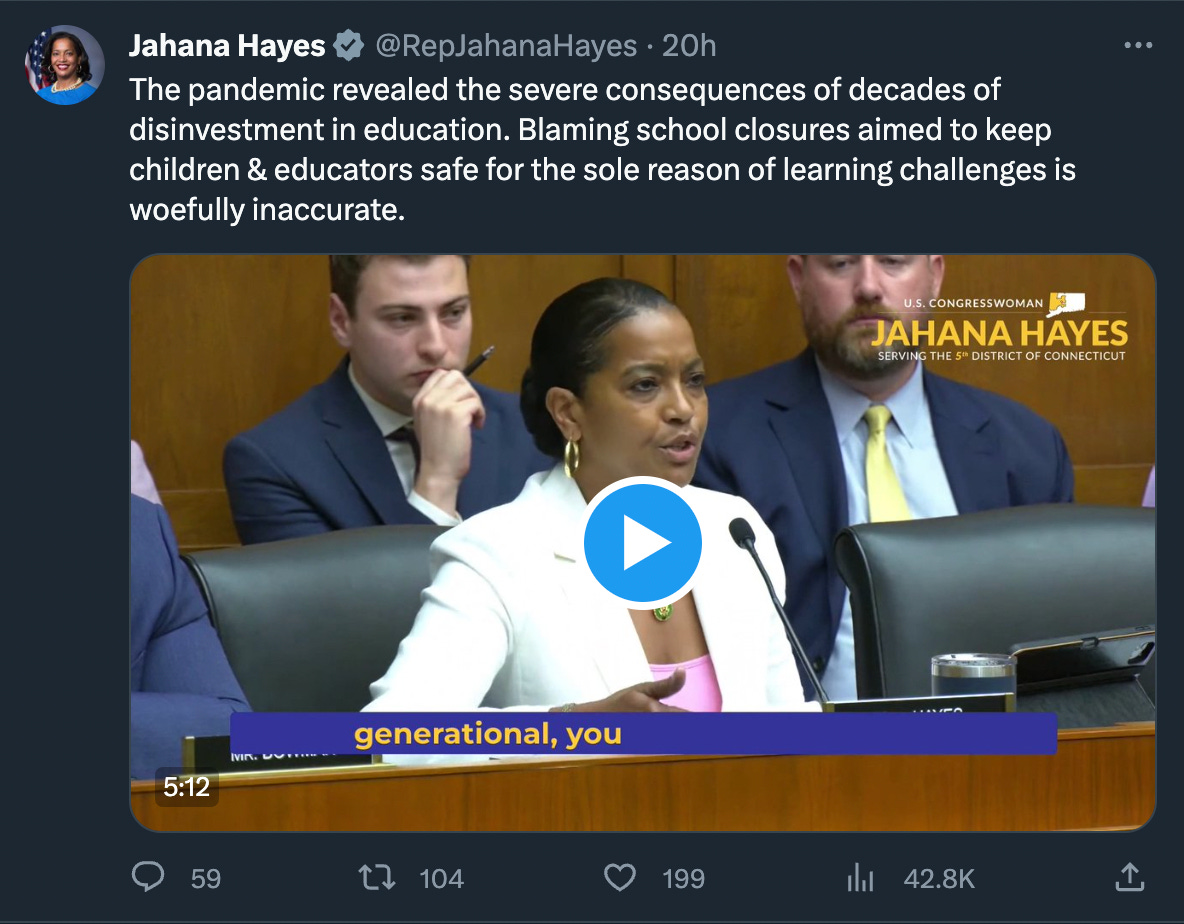Connecticut Congresswoman Suggests Schools Should Automatically Close in Future Pandemic
Representative Jahana Hayes expressed concern that schools might remain open when the next pandemic arrives.
At a combative House hearing yesterday titled “Generational Learning Loss: How Pandemic School Closures Hurt Students,” Republicans, Democrats, and education experts clashed over pandemic school closures and learning loss. Representative Jahana Hayes, a Democrat from Connecticut, however, said something particularly noteworthy after bemoaning what she described as disinvestment in public education:
So my question is, which is not even a real question because I don’t want an answer, if we have another pandemic, are you proposing that we don’t shut schools down?
Yes, the congresswoman seemed to suggest that when the next pandemic inevitably arrives schools should automatically close. Despite the catastrophic harms — learning loss, increased gun violence, stunted child development, and more — Hayes made clear that she believes school closures should probably occur.
While center-left European politicians — from the German health minister to a former Italian prime minister — have acknowledged extended school closures were an unnecessary mistake, most U.S. Democrats have been unwilling or unable to do the same. Indeed, at the same hearing where Hayes suggested schools should close in a future pandemic, Representative Jamaal Bowman, a New York Democrat, claimed that “if we would’ve kept school open, more people would have died due to Covid.” It is perhaps unsurprising that politicians who believe, without evidence, that extended school closures helped to slow the spread of and save lives from Covid-19 would endorse future closures. (Lack of accurate information about school closures and other non-pharmaceutical interventions is one reason why CDC needs to produce an exhaustive pandemic response report to inform a bipartisan pandemic commission.)
Data from across the globe, though, suggests that pandemic school closures were both harmful and avoidable. The evidence suggests that did not appear to slow the spread of the virus and imposed astronomical costs on children, especially girls. Education experts from the OECD, WHO, UNICEF, UNESCO, and World Bank wrote the following in July 2022:
…the data from the OECD, UNESCO, UNICEF & World Bank survey show no relationship between the extent of school closures and COVID-19 infection rates across countries. This shows that school closures were not inevitable but, rather, a policy choice, often framed by a lack of institutional capacity to reconcile educational provision with health and safety.
More recently, former Swedish State Epidemiologist Anders Tegnell offered a lengthy and nuanced response to an Irish audience when asked to describe how the Swedish government arrived at its decision to keep schools open for children under 16 throughout the pandemic.
In short, it is tremendously irresponsible and not evidence-based governance to just assume schools should close, because pandemic. The decision to close an essential social institution during a public health emergency — or other social crisis — should be made very carefully, with input from a variety of actors, and equal attention paid to the human rights of both adults and children.



